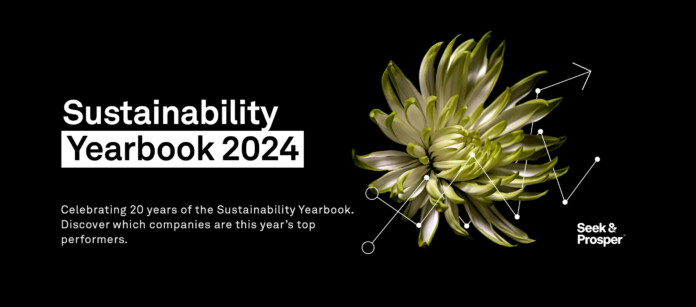Highlights
- Three Indian companies in the top 1% ranking
- A few Indian companies are global industry movers
- Only one-fifth of financial institutions have identified specific business opportunities related to climate change
- Public commitments to protect biodiversity and ecosystems remain rare across the corporate world
- The election results of 2024 have made everyone in the climate space anxious
Three Indian companies have earned their place in the global top one per cent of the 2024 S&P Corporate Sustainability Assessment ranking. Five Indian IT services companies found their place in the top five per cent and several more in the top ten global rankings announced recently. A few, despite lower scores, were found to be industry movers.
Hindustan Zinc Limited (S&P CSA Score – 85), Vedanta Limited (S&P CSA Score 80) in the metals and mining sectors and Hindalco Industries Limited in the aluminium sector (S&P CSA Score 78) were top performers.
In the IT Services sector’s top 5% S&P Global CSA Score, Tech Mahindra led with an impressive score of 86, followed by Wipro at 75, Infosys at 74, HCL Tech at 64, and Mphasis at 62. They were ranked among the 171 companies.
In the pharmaceuticals sector’s top 10% S&P Global CSA Score, Dr. Reddy’s Laboratories Limited was the sole name on the list.
JSW Steel Limited with a score of 75 was the best performer in the steel sector in India. Despite not being in the top one per cent, JSW Steel was named the industry mover, a significant honour when bigger names like Tata Steel (69) were in contention.
Only two Indian companies were in the top 10% score in the Real Estate Management & Development sector – Macrotech Developers Limited (77) and Godrej Properties (67).
The automobile sector had a surprise. In the top 10% S&P Global CSA Score, which assessed 58 global companies, Hyundai Motors ranked first with a 75 score, industry mover Kia Corp at 73, India’s Mahindra & Mahindra came close at 70. It beat Tata Motors squarely at (64).
Although Asian Paints Limited scored a modest 61 in the paints sector, it was called the industry mover.
There was no surprise in the personal products sector. Hindustan Unilever scored an impressive 75, with Dabur India close at 72. Godrej Consumer Products scored 67. Dabur was named the industry mover.
India’s renewable energy leader ReNew scored an impressive 71 registering an impressive growth of almost 30% from its FY 2023 score of 55. This achievement places ReNew in the top 10 percentile of the global energy sector.
https://www.spglobal.com/esg/csa
20th Anniversary Edition
The 2024 edition of the S&P Global Sustainability Yearbook was its 20th. It has been offering business leaders and long-term investors interested in measuring sustainability performance comprehensive, detailed, and trusted data and insights. It has been helping companies find a useful link between their sustainability goals and their business strategies.
Covering over 13,000 companies globally, the CSA is an annual evaluation of a company’s sustainability practices. It enables member companies to benchmark their performance on a wide range of industry-specific economic, environmental, and social criteria that are relevant to the growing number of sustainability-focused investors and are expected to be financially relevant to corporate success.
In 2023, over 3,500 companies participated in the CSA – up from 3,000 in 2022. The CSA compares companies across 62 industries via industry-specific questionnaires that assess, on average, 23 sustainability topics in 110 questions. Based on their performance, companies receive scores ranging from 0 to 100 and percentile rankings for financially relevant sustainability criteria.
To ensure the quality and objectivity of the CSA, S&P Global voluntarily appoints an independent third party to conduct an external audit of the assessment process each year.
Stakes are High in 2025
The year 2024, the outcome of the year of the elections, has made the world anxious. “The stakes are high as we head into 2025. Research from S&P Global Ratings finds that many parts of the world face rising exposure to climate hazards, including hotter, drier conditions and more extreme flooding by 2050. Climate hazards may further exacerbate economic impacts, making adaptation and resilience measures more urgent,” observes the 2024 S&P Report.
On the global stage, the biodiversity 2024 COP16 in Cali, Colombia, climate COP29 in Baku, Azerbaijan, and desertification COP16 in Riyadh, Saudi Arabia — put this trio of challenges squarely in the global spotlight, revealing risks and opportunities for the corporate world.
The report observed that financing was a big part of finding solutions to nature loss and climate change. “Trillions of dollars in financing are needed to mitigate global warming and adapt to climate risks, yet research from S&P Global Sustainable1 finds that only one-fifth of financial institutions have identified specific business opportunities related to climate change.”
It further explores how the sustainable financing landscape is evolving to include more issuance of blue bonds and loans — specialized financing instruments dedicated to funding projects focused on ocean- or water-related initiatives in the sustainable debt market. Even as international conclaves focused more on the business risks of nature degradation and biodiversity loss, S&P Global Sustainable1 research shows that public commitments to protect biodiversity and ecosystems, halt deforestation and assess biodiversity impacts remain rare across the corporate world. From cleantech to climate change, while AI is a common thread running through these discussions S&P Global Sustainable1 explores how the business world is weighing the costs and benefits of climate change and the energy transition.










